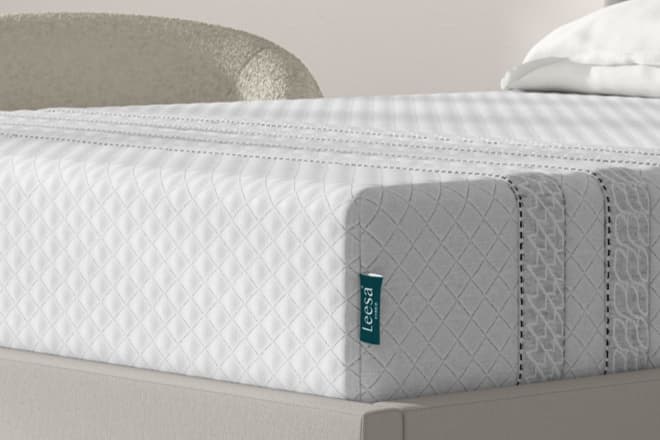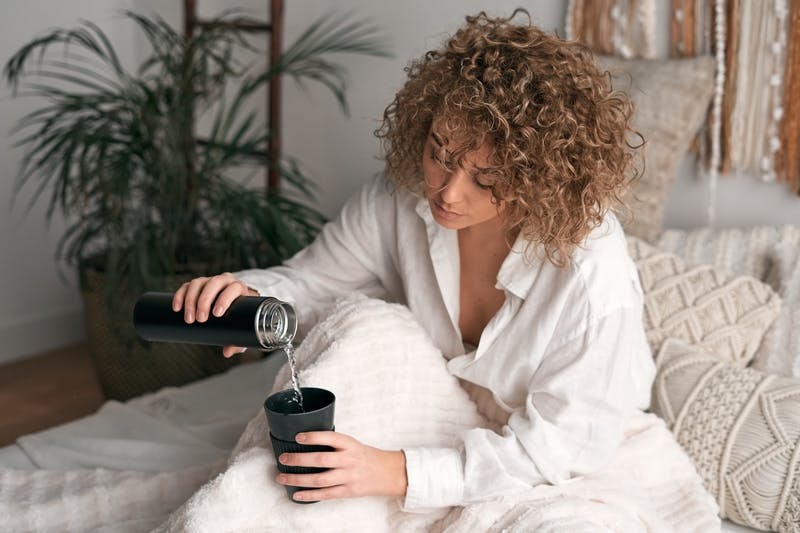Does drinking water keep you awake?
You may immediately think, "of course!" because getting up to go to the bathroom is one of the most common reasons for nighttime wakeups. But did you know that not getting enough water can actually impact the quality of your sleep? Not to mention, the effects of dehydration are similar to the effects of lack of sleep. If you don't get enough water, you may feel sluggish, experience mood swings, and generally feel off.
So how can you reach that middle ground where you can get the best night’s sleep?
Benefits of Drinking Water Before Bed
Believe it or not, nighttime trips to the restroom notwithstanding, drinking water before bed can have many positive benefits. It can help to:
Improve weight loss
Prevent headaches
Maintain an even body temperature
Improve your mood
Detox your body
Improve digestion and gut health
Lubricate your joints
Protect your spinal cord
It stands to reason that since the human body is comprised of 60% water, maintaining a healthy fluid intake is essential to overall health and well-being. So make it a practice to grab a glass of water about two hours before bed (and, of course, drink another big glass in the morning when you first get up.) That way, even if you forget to drink enough water during the day, you'll have a head start on your water intake.
Negative Effects of Dehydration
We’ve all experienced it—you get to the end of your day and realize you’ve only had a few sips of water. Not good! When you’re dehydrated, you may experience:
Increased thirst and a dry mouth
Fatigue and confusion
Headaches and dizziness
Dry skin
A rapid heart rate
Fever
Cramping
It’s happened to all of us. You’re busy and sometimes the day gets away from you. However, if you’re not careful, constant dehydration can cause severe problems. Make sure you talk with your doctor if your symptoms are severe or if you’re having a hard time maintaining healthy hydration levels.
Dehydration and Sleep Deprivation
Let's talk about a few ways your body may be impacted by going to sleep dehydrated.
Not only will dehydration affect your everyday life and overall health, but it will also impact your sleep quality. Even though your body is mostly still while you sleep, sleep is actually an active period where your body restores chemical balances, repairs, and recovers.
One of the most important benefits of sleep is helping the brain form short- and long-term memories. When you sleep, your brain processes, transfers, and stores all the information you take in during the day. If you're not getting quality sleep, you may experience memory loss, trouble concentrating while awake, mood swings, a weakened immune system, poor balance, weight gain, and risk of disease.
Being dehydrated when you go to sleep will negatively affect the way your body restores itself and can interrupt your sleep cycle. Below are some of the other ways that dehydration can interrupt a good night’s sleep.
Dehydrated Sleep = Dry Mouth and Nose
When you go to bed dehydrated, you risk not getting a good night’s rest. You may experience a dry mouth and dry nasal passages, which can cause snoring, even if you’re not a regular snorer. This can keep you up, wake you up and not to mention, keep your partner up, too. The dryness can also cause a sore throat and hoarse voice when you wake up.
Going to Sleep Dehydrated Can Cause Cramping
Have you ever woken up in the middle of the night with an excruciating leg cramp? Some people call them Charlie horses. If you haven’t had enough water during the day or before bed, you may experience cramping like this while you sleep, especially in your legs. This can be very painful, waking you up and keeping you from getting a good night’s sleep.
A Night of Dehydrated Sleep Impacts your Whole Day
Other than the obvious fact that waking up multiple times in the middle of the night means you’re not getting enough uninterrupted REM sleep, going to bed dehydrated can have negative implications for the following day.
You may feel less alert and experience a lack of energy. Many people even notice that going to bed dehydrated affects their cognitive performance. That is their thinking, reasoning, and remembering skills! Kind of important.
Important note: Even if you think you’re well-hydrated when you go to bed, you may be surprised to learn that you lose fluid while you sleep. Yep—even just breathing while you sleep, you lose fluid, especially if you snore or breathe through your mouth. Not to mention, you lose more fluid if you get sweaty while you sleep, have worked out closer to bedtime without rehydrating, or had a lot of alcohol before going to bed.
Water and Sleep Best Practices
Unfortunately, you can’t fix your dehydration problems by chugging water before bed. That can have a negative impact on your sleep. If you wait until the end of the day to drink all your fluids, you’ll probably have to get up multiple times in the night to use the bathroom.
Get your Daily Intake of Water
To be hydrated and therefore, get your best rest, you want to stay hydrated throughout the day. People used to say a good rule of thumb for water intake was 8 glasses a day, but now the National Academy of Medicine recommends drinking about 11 cups for the average female and about 15 cups for the average male. That may seem like a lot, but this also includes any water from foods you consume. And don’t forget, the amount of water you need varies from person to person and depends on your weight and height, level of exercise, and diet, so chat with your doctor to figure out the right amount of water for you.
Pro tip:
Don’t feel like measuring every ounce of water you drink? (We don’t blame you!) A good way to determine if you’re getting enough water is simple—drink water when you’re thirsty. Your body is smart. It will tell you when you need more water.
Keep a Reusable Water Bottle Near You
Another good practice to stay hydrated is to keep a reusable water bottle with you. If you always have water available, you’ll be able to quench your thirst whenever you need to. Plus, a reusable water bottle helps you keep track of how much water you've had. If you have a 20-ounce water bottle, you can do the math to keep up with how much water you've had and how much you still need to drink in a day. Not to mention, a reusable bottle reduces waste and is better for the planet. Slide your reusable bottle in your purse or backpack, and keep it on your desk at work or on your nightstand so that you can stay hydrated and healthy.
Create A Bedroom Sanctuary
Getting good rest is about more than getting enough water (although that certainly helps!). Having the right mattress and pillow is super important to get your best sleep. Create a bedroom sanctuary that encourages rest and relation, one that you enjoy spending time in and look forward to coming home to every day.

How to Get Rid of Water Retention Overnight?
The converse of dehydration is edema, or your body holding on to excess water. We know that the body loses water during the night, between breathing, other bodily functions, and sweating. But if you wake up with puffy eyes or fingers or even ankles, that can be a sign that something's up. Before you freak out, there are some simple things you can do to reduce your risk of edema.
Reduce Intake of Salt
Let's be honest: most Americans are addicted to table salt. There are a few ways that you can reduce your salt intake gradually. Your body will thank you. Let's take a look:
-
Check labels. Most processed foods, including deli meat, pizza, burritos, and tacos, are high in salt. So are most prepared foods.
-
Add spices, herbs, and acidic ingredients like vinegar or lemon juice to flavor your food. There are also many salt-free seasonings available at the store.
-
Buy salt-free canned foods.
Eat Fewer Carbs
Complex carbohydrates are good — think of brown rice or whole grain bread — but in general, simple carbs like white bread, white pasta, potatoes, soda, sweetened iced tea, and fruit juices are not your friend. The body immediately converts these simple carbs into glycogen, a sugar, boosting your chances of Type II diabetes. When you eat carbs, your body stores unused energy as H20.
Take an Electrolyte Supplement
Resetting your body's supply of electrolytes is an easy way to tackle water retention. There are more products available now than there used to be. Many of them come in powder form, and you can add those to your water. Electrolytes help your body rebalance your fluid levels. Take care, though — many electrolyte drinks contain carbs and sugars.
Drink More Water
This may sound redundant, but drinking more water is another simple way to beat the bloat. Drinking more water helps keep your digestive tract chugging along smoothly, relieving gas and related bloating. It also rebalances the salt levels in your body, helping you shed water weight fast.
Take Supplements
Supplements can be great for your overall health, and if you want to avoid or reduce water retention, two of them are standouts: Vitamin B6 and the mineral magnesium. Calcium and Vitamin B5 (pantothenic acid) also have a diuretic effect on the body. So do some herbal supplements such as dandelion root, horsetail, parsley, and green and black tea. Be sure to speak to your doctor if you suspect you may have a deficiency in these nutrients or if they might react poorly with any medication you're on.
Takeaways
So, does water keep you awake? Yes, literally. If you're on a long drive, chug water, not cola or coffee, to stay bright and perky. Does water keep you awake at night? Sure it can because it makes you go to the bathroom throughout the night. All things in moderation —maintain your daytime water intake and drink a nice big glass of H20 about two hours before bed.
Think you could be sleeping better? Check out these sleep tips from highly successful people. Find out what they do to make sure they're getting their best rest to be the best versions of themselves. Or head to our Better Sleep Guide to create more healthy sleep habits.



